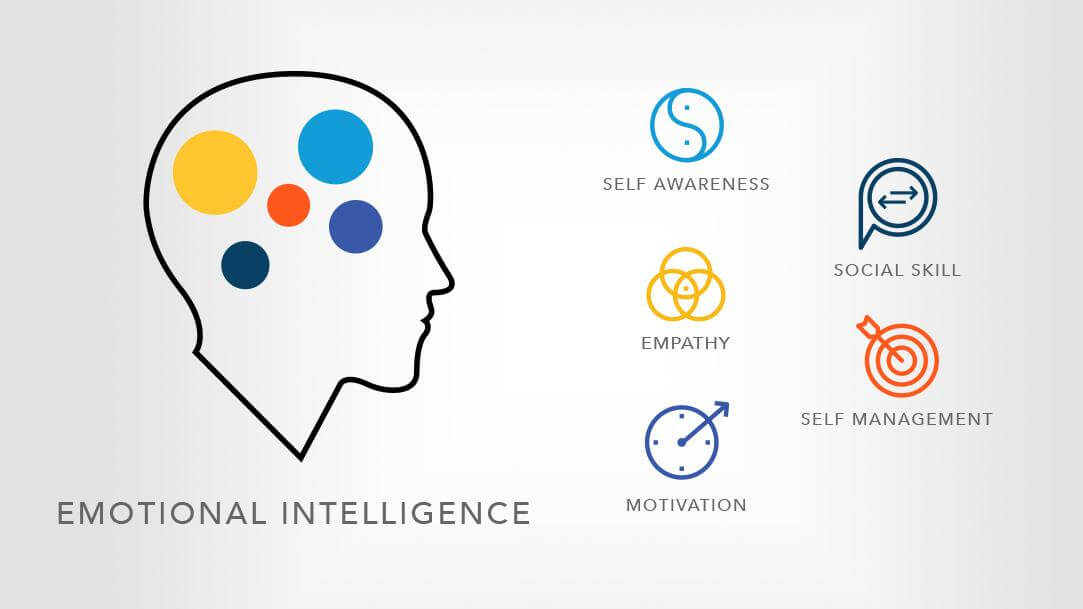Emotional Intelligence – EQ or EI
A term coined by two researchers, Peter Salavoy and John Mayer, and got famous after Dan Goleman wrote his book of the title in 1996.
Normally, People are familiar with the term Intelligence Quotient (IQ).
EQ is emotional intelligence, which is all about identifying emotions in ourselves and others and communicating our feelings depending upon a situation and the second person.
IQ, on the other hand, is cognitive intelligence, as it is the type that is most often referred to when the word “intelligence” is coined.
But, what’s more important – IQ or emotional intelligence?
If you think IQ is more important, then you might be amazed after getting to know that EQ is more important as experts claim that it’s more important for our success than cognitive intelligence.
Emotional intelligence (also known as Emotional Quotient, or EQ) is one’s ability to monitor his/her own emotions as well as the emotions of other beings around, to discriminate between and label various emotions correctly, and to use emotional information for decision making and delivering behavioral outputs, that may influence one’s own life and others as well.
Emotional intelligence is what we use when we deal with our coworkers, have deep conversations about our relationships with significant others. It allows us to establish a connection with others, understand ourselves better, and live a more healthy and happy life.
Although there are many kinds of intelligence, and they are often connected to one another, there are some very significant differences between them.
The 5 Components of Emotional Intelligence are:
Self-Awareness.
Self-Regulation.
Motivation.
Empathy.
Social Skills.

Self-awareness can be defined as the ability to recognize and understand one’s own emotions. It is the very basic building block of emotional intelligence, since regulating ourselves, having empathy for others, and so on all rely on identifying and understanding emotion within. If you want to conquer the world, start conquering yourself first.
Self-regulation is one step ahead, to have high EQ, we must not only be able to recognize our own emotions, but we must also be able to control them and express them in an appropriate and acceptable manner.
Motivation (Intrinsic motivation) allows People to remain motivated for internal reasons rather than external rewards like gaining wealth, respect, or fame. Those with high EQs are motivated for their own personal reasons and work toward their own goals.
Empathy can be defined as the ability to understand how other people are feeling and recognize, on an intimate level, how you would feel if you were in their position. Everyone behaves in different way according to his/her perspective and experience of life.
Social skills are the last segment of the EQ body. These skills are what allow people to interact socially with one another and to successfully navigate social scenarios as well as crisis. Those with high EQ levels generally have higher-than-average social skills and are able to effectively overcome their problems and achieve goals.
The 4 Dimensions of Emotional Intelligence:
According to EQ “founding fathers” Salovey and Mayer, there are four distinct dimensions or branches of emotional intelligence that form a hierarchy of emotional skills and abilities:
Perceiving emotion.
Using emotions to facilitate thought.
Understanding emotions.
Managing emotions.

Psychological Perspective:
Emotional intelligence filled a void in the mainstream understanding of intelligence, especially for psychologists. The field always appeared to possess a general understanding that IQ is not everything, but the theories on what, exactly, the other important components were varied greatly, and psychologists couldn’t agree on a single concept or idea.
When the idea of emotional intelligence was first introduced, psychologists came to know that it was the aspect of intelligence they’d been missing for so long.
Impacts on our Life:
EQ and our ability to rely on it as a stock helps us in so many ways from assisting in looking after our physical and mental health and well-being, through to our ability to inspire and lead.
It is the driver of success doesn’t just apply to our personal lives. It applies in the workplace also.
Emotional intelligence creates a strong influence on health-related outcomes because it reduces the perception of stress in response to trying situations. Emotional intelligence strengthens our brain’s ability to deal with emotional distress.
In the workplace and in our personal lives being emotionally intelligent is an essential component to develop sound mental health and successful change. EQ contributes to effective change management by developing emotional maturity and by increasing social intelligence.






















Leave a Reply